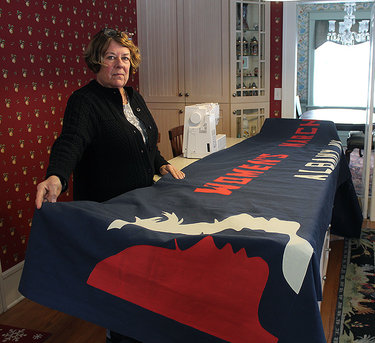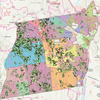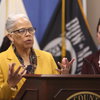Across the country, last year’s Women’s March gave rise to ‘huddles’ to effect change
The Enterprise — Michael Koff
Pride in her work: Martha Harausz of McKownville stands with the banner she sewed for the upcoming anniversary women’s march. The march will be held Saturday, Jan. 20 in cities around the country and the world, including Albany. The banner incorporates the shadow images of women’s faces that make up the march’s logo.
ALBANY COUNTY — Meeting once a week gives all of them energy, said one member. Another said that meeting weekly allows members to plan for and take part in many different activities being held in the area. “It’s like a train that never stops,” said a third.
They were speaking about their “huddle,” the Bethlehm Morning Voice Huddle, one of thousands of small groups of people, across the country, who were shocked and alarmed by Donald Trump’s election.
The organizers of the first Women’s March, held a year ago on Jan. 21, 2017, suggested that marchers form huddles to harness the energy of the march and turn it into action.
An anniversary event is planned for Jan. 20. In Albany, it will be held at Capitol Park. Organizer Castina Charles said this week that the rally will be followed by a march, although “an exact route has yet to be determined, as we are still working with the city of Albany in trying to close off some of the surrounding streets.”
“From a march to a movement,” said Martha Harausz at her huddle’s meeting at a bagel shop in Delmar last Wednesday. Harausz is one of the huddle’s three regular members who live in Guilderland. Most of the others are from Bethlehem.
The huddle has two main priorities, said member Dick McGrath: working as a group to educate themselves on topics that matter to them, and then taking action. “Our big thrust is, we get more informed, to start with. Then we start to figure out how to bridge the gaps and change things,” he said.
Like other huddles, Bethlehem Morning Voice has needed to select, based on the topics its members are most interested in, just a few issues to focus on. The central issues that this huddle works on are single-payer health care, gun safety, and access to voting rights. On Wednesday, they addressed the first two.
Last Wednesday, 12 people — 10 women and two men — gathered in the conference room at the bagel shop where the huddle regularly meets. Initially, the group’s founder, Felicia Bordick, sent out an email to about 20 women, and within a month the group had attracted another 10 women from other parts of the Capital District. After a few months, Bordick said, the group naturally whittled down to its current “baker’s dozen” that attend regularly.
Anita Pratt, 69, said that many of the members have never been involved with political action before. Pratt is a naturalized citizen born to Latvian parents in Germany, where her mother spent time in a refugee camp. She and her family came over to the United States on a U.S. Army boat after World War II, when she was very young. That was a time, she said, when “America was really opening its arms to immigrants.”
Pratt is retired from the New York State Office of Children and Family Services.

Dick McGrath of Delmar, left, and Kathy Hodges of Guilderland are members of the Bethlehem Morning Voice Huddle, which meets weekly to work on issues including support for single-payer health care and gun safety.
The divisiveness of Trump’s rhetoric during the campaign — and his victory in the election — stunned and depressed her, Pratt said. “I had a feeling of, ‘We as a country are better than this, and what can I do?’”
Many members of the huddle, which meets during the traditional workday, are retired.
Judy Guzewich of Albany is a retired administrative assistant and was not involved in political action, she says, “prior to this administration.” She says that 2016 was not a change in administration “as much as it was a change in what makes sense, what is moral, what is democratic.” She said she views retirement as “a special time” in her life, when she has freedom from work and from childcare and is able to “give back.”
Guzewich believes change is needed, “not just for me, but now for my children and grandchildren.”
One of the group’s youngest members, Tracey Fountain, 36, said this week that she makes a point of examining all issues carefully, to decide how she feels, “regardless of what party supports or opposes it.” She says her main concern has been “the open hatred the administration espouses toward anything different or other.”
Toni McGrath, who is married to fellow huddle regular Dick McGrath, said this week that she and her husband and their friends never considered that the women’s march meant to exclude men, so all of them went together to take part in the march in Washington last year. “And I guess we never considered the huddle to be a women’s group. We would welcome more men,” she added.
Single-payer health care
Huddle members talked last week about their upcoming event in February, in which Andrew Coates, M.D., the former president of Physicians for a National Health Program, will hold an informational meeting on Medicare for All. This program is an encore of a similar one a year ago that drew about 130 to 150 people.
Toni McGrath said that Coates will be joined this year by George Jolly, M.D., who has “written a logarithm that we plug in to see how our taxes would be affected if Medicare for All were to be implemented.
She has visited town officials, McGrath said, to recommend that, as town officials, they should attend the February event.
Harausz told the huddle members that she is planning to visit Guilderland town officials to invite them. Harausz, a retired elementary-school teacher, is a member of Guilderland’s Environmental Conservation Advisory Council.
Gun safety
Harausz, who leads the huddle’s gun-safety committee, began at Wednesday’s meeting to talk about the committee’s last meeting, when another member asked a question that included the phrase phrase “gun control.”
Harausz was quick to correct her, saying, “We don’t want control. We want safety.”
The huddle members heard that the gun-safety committee had visited New York State Senator Neil Breslin in December, to speak with him about gun safety, in the huddle’s first foray into direct lobbying. Topics were, Fountain said, keeping in place the New York Secure Ammunition and Firearms Enforcement, or SAFE, Act of 2013 — which requires universal background checks on gun purchases — and banning the sale of bumpstocks, an attachment that enables a semiautomatic rifle to fire faster.
“It was a good meeting,” Fountain said, “so we’re feeling confident. I think it went really well.”
Fountain mentioned the issue of concealed-carry reciprocity, and said that this had passed in the House of Representatives last year, but had not passed in the Senate.
The Concealed Carry Reciprocity Act would oblige every state in the United States to recognize a concealed-carry gun permit issued by any other state. So a state like New York with very rigorous standards for receiving a concealed-carry permit would need to recognize permits from states that have much less restrictive policies.
Dick McGrath mentioned a survey — actually there have been more than one — that found that 74 percent of National Rifle Association members are in favor of universal background checks. “In spite of that,” he said, “our government can’t get to that.”
McGrath said, about concealed-carry reciprocity, “This is a great irony of states’ rights here. This is the opposite of the Republican Party’s stated position.” He said that this issue is about the right of New Yorkers to determine their own positions on issues, rather than to have regulations imposed on them by the states with the most lax standards.
McGrath noted that the informational event on single-payer health care that the group will hold in February is not an anti-Republican event. “It really fits,” he said, “a conservative agenda: saving money.”



